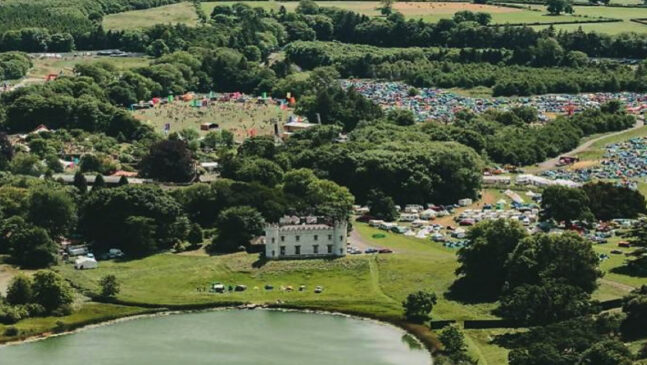Tim Benson, Chair of Powerful Thinking, gives a round up of the ‘Sustainable Power for Festival Campsites’ Panel, held at the Vision: 2025 Conference last month, ahead of a new resource for event organisers launching in December.
Tim recounts key experiences and learnings shared by panel guests; Megan Best of Native Events/Body & Soul Festival (Ireland), Jake Pearce of Pearce Hire (UK), as well as gems of wisdom from the wider Powerful Thinking board; he looks at some easy wins for campsite lighting, explores how campsites can be a proving ground for innovation and shares his (somewhat controversial) views on biofuels…
“Ahead of launching our new festival campsite resources, I thought it might be useful to summarise the lively panel discussion that we hosted as part of the Vision: 2025 Conference at last month’s Showman’s Show. The panel featured Megan Best of Native Events/Body & Soul Festival (Ireland), Jake Pearce of Pearce Hire (UK) & included gems of wisdom from the wider Powerful Thinking board.
The general consensus was that campsites often play second fiddle to other festival areas when it comes to power provision. Often older generators with inaccurate analogue panels and no telemetry are sited in these areas, making it difficult to monitor energy usage with any degree of accuracy. Power advancing for campsites can also be hit and miss, especially in terms of food traders and glamping facilities; generators are often powered up and simply left running until the last camper has vacated the fields, with zero onsite interventions to improve efficiencies.
At Body & Soul Festival, Megan successfully trialed restricting the operating hours of some campsites amenities to help reduce fuel consumption. The usage patterns of these amenities, for example showers, info points & campsite stores, are fairly predictable, so provided festival-goers are made aware of opening hours, this can be an effective and non-disruptive solution. Jake made the point that, where restrictions could not be put in place, factoring in diversity was key to ensure that generators were not oversized for the actual campsite demand, especially in terms of power provision for live in vehicles and crew camping areas.
Campsite lighting was another hot topic for debate. It still shocks me when I see kilometers of festoon lighting and numerous flood lights left on 24/7 throughout festival campsites, and indeed other site areas. The excuses that I have heard for this kind of behavior have ranged from, ‘well it’s only light bulbs, what harm can that do?’ to, ‘we just don’t have the crew to go round switching things on and off’. The panel and audience all agreed that this laissez-faire attitude can have a very real impact on energy consumption and secondly it sends terrible messages to the festival-goers about the organiser’s attitude to energy efficiency. Jake cited some very simple tech solutions that can be employed to automate campsite lighting, including inline timers and photovoltaic sensors that open and close circuits depending on ambient lux levels.
Campsites as a proving ground for innovation was also discussed. Megan recounted how Body & Soul was one of the first festivals in Ireland to try out hybrid power generators in their crew camping area. This trial actually spurred them on to design and build their own battery system fed by solar, which was then introduced to the main festival site with great success. Jake agreed that hybrid systems, whereby generators manage the peak load whilst charging the systems batteries and then switch to battery only for baseload management, certainly have a role to play, but that hire costs could be prohibitive for smaller, shorter festivals. However, he conceded that, with the pending hike in fuel duty coming into play as of 1st April 2022, hybrid systems would almost certainly gain greater market penetration.
Somewhat controversially, I suggested that the wider use of biofuels was actually leading to greater inefficiencies, as it almost excused organisers for sticking to their business-as-usual power management models. I further argued that it discouraged them for seeking to address the number one priority in the power management hierarchy, which is use less power and use it more efficiently. Here Jake cited examples of how Pearce Hire set their generators up in a load demand configuration: what this involves is replacing stand alone large gensets with smaller synced twin-packs, where one runs constantly to manage the baseload (the priority 1 set) and the second one only kicks in when the demand increases beyond a programmed threshold (the priority 2 set). As the demand drops, the priority 2 set switches off and remains in standby until called upon again. This fully automated process is now widely used by many festivals, but there remains a shortage of syncable units under 100kVA, making this a less efficient solution for smaller camping festivals where peak campsite demand is considerably lower than 80kW.
It only remains for me to say a huge thank you to; Megan, Jake and all the Powerful Thinking board members for their invaluable contributions to our campsite resource pack. The full guide to more sustainably powering campsites will be available for free on our website in late December.”
This guest blog originally appeared in the November 2021 Vision: 2025 newsletter. Sign up to receive monthly event sustainability news, case studies and guest blogs direct to your inbox www.vision2025.org.uk

